It seems like out of all the combinations of poultry raising, I see this one the most. So, I've made a short article on the do's and dont's of raising chicks and ducklings together:
Since chicks and ducks are the most common fowl to be found at the feed store, many people find themselves thinking, "Well, gee I was planning to just come get my 3 or so pullets and leave." HOWEVER, they couldn't help noticing the irrisistable, bright, beady-eyed ducklings in the next brooder over. "Great, I used to pride myself in self-restraint." A smile breaks over them and before you know it, it's all over and you are riding home with a baby duck or two, and (if you're like me) more chicks than you planned for too.
Others, still in the planning stages, perhaps stumbled over a column on duck raising somewhere in their chicken readings and couldn't help but read on until finally they are wondering "Well can I just brood ducks with my chicks?" So begins my opinion on the matter.
Think seriously about space
In short, yes. You can brood ducks with chicks, but there are many set-up and cleaning issues that need to be addressed first. In all seriousness....be completely honest with yourself now...how many birds are you planning to get? If you get there and you fall prisoner to chicken math, you're not in trouble, but let's just set a number to be safe. A ball-park, if you will. I raised 4 baby chicks last spring with 1 pekin duckling (who turned out drake) and the breed of duck you get will have something to do with spacing. I would allow 1-2 large breed ducks for every 4 chicks. 2-3 smaller breed ducks for every 4 chicks. My Indian Runner chicks were a lot smaller than the Pekin. I would also allot a baby duck more square inches of room than a chick. To give you an idea, I used a 2'X 3' cardboard box as a brooder and after 2 weeks, I added another one of the same size on. Ducks are already slightly larger than chicks and will grow faster, so do not underestimate the space you will need. Overcrowding and competition for spots at the water, food and light will not end well.

Light/heat
Lighting and heat for ducklings is essentially the same, but ducks grow more fat and down than chicks so they may over heat faster. Make sure there is plenty of room away from the lamp for ducklings to go. Chicks enjoy cuddling with fuzzy ducklings, by the way.

The Water Phenomenon
Ducks drink water. Ducks dabble and drip water. Ducks swim in water. Ducks poop water. The biggest key (and challenge) to brooding ducks and chicks together is keeping the space dry. I recommend to everyone I talk to who is brooding ducks to axe the pine shavings and newspaper and go buy yourself a bag of horse-stall type wood pellets (NOT stove burning) . This will save you a couple headaches. My ducklings liked to chew wood shavings, which in all honesty probably didn't hurt them and mostly chew is all they did, they didn't eat that much of them. They are like babies gumming new things, but they wouldn't eat wood pellets.Wood pellets are more absorbent so you don't have to change them as much and they smell nicer longer. They are also great on the compost heap. Make sure whatever you buy does not contain cedar as it is toxic to all birds.
Secondly, waterers must be elevated and/or set inside another larger dish so that water that gets dabbled spills into the dish and not into the bedding. Also make certain that the ducks cannot get into the drinking water dish. A duckling may go for swims as early as a few days, but only in warm water under close supervision, and only for a few minutes at a time to avoid water-logging. Ducklings that have no adult plumage must be toweled off after and put under the lamp. Did I mention the waterers will have to be filled twice as often when there are ducks?


FOOOOOD...
This is the easy part. Ducks and chicks may both be fed an all-purpose, non-medicated feed crumble. Purina Flock-Raiser works great. In fact a ducks diet through most of it's life is basically the same as a chickens, even most of the treats are liked equally by both species. Be mindful that a duck possesses a crop-type digestive system just like a chicken and therefore will require grit to digest anything that is not it's crumble feed. Note: ducklings may require extra Niacin in their diet as it promotes good leg structure and development. It is easy to go to your supplememnt store and pick up a few caplets, grind one up and add about 100 mg per gallon of water. Also Cheerios and some other cereals are fortified with Niacin which can also help, but be sure you don't feed anything too sugary. You can also use Brewer's yeast to supplement Niacin.

Both chicks and ducks are about ready for the outdoors at the same time as well. At this point I do recommend seperate housing, although they may still share a run like mine do, but only if you have females only. Drakes housed in the same area as chickens may choose to go after them and can cause serious damage. This is why I re-homed my guy and re-ordered 2 females. If you aren't prepared to provide extra housing and a seperate run for ducks with drakes, make sure you buy sexed ducklings only.
Duck eggs are also really tasty! I love both species and have thouroughly enjoyed the experience I have had with both. The personalities are very different. If in doubt, try a couple and since owning poultry is such an addicting hobby as we all know, you can add more later.

Raising Baby Chicks
Ducks
Happy hatching!
Since chicks and ducks are the most common fowl to be found at the feed store, many people find themselves thinking, "Well, gee I was planning to just come get my 3 or so pullets and leave." HOWEVER, they couldn't help noticing the irrisistable, bright, beady-eyed ducklings in the next brooder over. "Great, I used to pride myself in self-restraint." A smile breaks over them and before you know it, it's all over and you are riding home with a baby duck or two, and (if you're like me) more chicks than you planned for too.
Others, still in the planning stages, perhaps stumbled over a column on duck raising somewhere in their chicken readings and couldn't help but read on until finally they are wondering "Well can I just brood ducks with my chicks?" So begins my opinion on the matter.
Think seriously about space
In short, yes. You can brood ducks with chicks, but there are many set-up and cleaning issues that need to be addressed first. In all seriousness....be completely honest with yourself now...how many birds are you planning to get? If you get there and you fall prisoner to chicken math, you're not in trouble, but let's just set a number to be safe. A ball-park, if you will. I raised 4 baby chicks last spring with 1 pekin duckling (who turned out drake) and the breed of duck you get will have something to do with spacing. I would allow 1-2 large breed ducks for every 4 chicks. 2-3 smaller breed ducks for every 4 chicks. My Indian Runner chicks were a lot smaller than the Pekin. I would also allot a baby duck more square inches of room than a chick. To give you an idea, I used a 2'X 3' cardboard box as a brooder and after 2 weeks, I added another one of the same size on. Ducks are already slightly larger than chicks and will grow faster, so do not underestimate the space you will need. Overcrowding and competition for spots at the water, food and light will not end well.
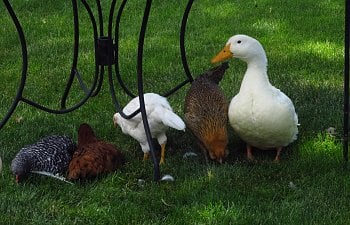
Light/heat
Lighting and heat for ducklings is essentially the same, but ducks grow more fat and down than chicks so they may over heat faster. Make sure there is plenty of room away from the lamp for ducklings to go. Chicks enjoy cuddling with fuzzy ducklings, by the way.
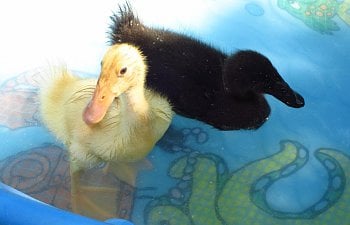
The Water Phenomenon
Ducks drink water. Ducks dabble and drip water. Ducks swim in water. Ducks poop water. The biggest key (and challenge) to brooding ducks and chicks together is keeping the space dry. I recommend to everyone I talk to who is brooding ducks to axe the pine shavings and newspaper and go buy yourself a bag of horse-stall type wood pellets (NOT stove burning) . This will save you a couple headaches. My ducklings liked to chew wood shavings, which in all honesty probably didn't hurt them and mostly chew is all they did, they didn't eat that much of them. They are like babies gumming new things, but they wouldn't eat wood pellets.Wood pellets are more absorbent so you don't have to change them as much and they smell nicer longer. They are also great on the compost heap. Make sure whatever you buy does not contain cedar as it is toxic to all birds.
Secondly, waterers must be elevated and/or set inside another larger dish so that water that gets dabbled spills into the dish and not into the bedding. Also make certain that the ducks cannot get into the drinking water dish. A duckling may go for swims as early as a few days, but only in warm water under close supervision, and only for a few minutes at a time to avoid water-logging. Ducklings that have no adult plumage must be toweled off after and put under the lamp. Did I mention the waterers will have to be filled twice as often when there are ducks?

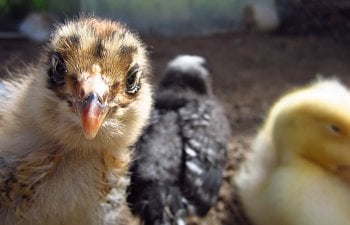
FOOOOOD...
This is the easy part. Ducks and chicks may both be fed an all-purpose, non-medicated feed crumble. Purina Flock-Raiser works great. In fact a ducks diet through most of it's life is basically the same as a chickens, even most of the treats are liked equally by both species. Be mindful that a duck possesses a crop-type digestive system just like a chicken and therefore will require grit to digest anything that is not it's crumble feed. Note: ducklings may require extra Niacin in their diet as it promotes good leg structure and development. It is easy to go to your supplememnt store and pick up a few caplets, grind one up and add about 100 mg per gallon of water. Also Cheerios and some other cereals are fortified with Niacin which can also help, but be sure you don't feed anything too sugary. You can also use Brewer's yeast to supplement Niacin.
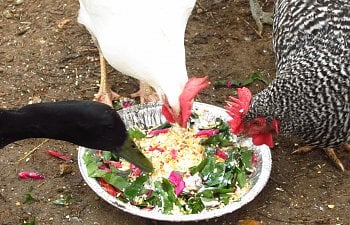
Both chicks and ducks are about ready for the outdoors at the same time as well. At this point I do recommend seperate housing, although they may still share a run like mine do, but only if you have females only. Drakes housed in the same area as chickens may choose to go after them and can cause serious damage. This is why I re-homed my guy and re-ordered 2 females. If you aren't prepared to provide extra housing and a seperate run for ducks with drakes, make sure you buy sexed ducklings only.
Duck eggs are also really tasty! I love both species and have thouroughly enjoyed the experience I have had with both. The personalities are very different. If in doubt, try a couple and since owning poultry is such an addicting hobby as we all know, you can add more later.
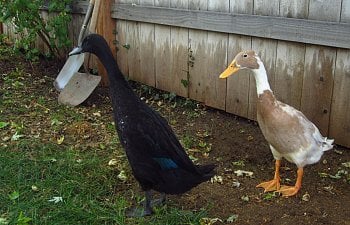
Raising Baby Chicks
Ducks
Happy hatching!
